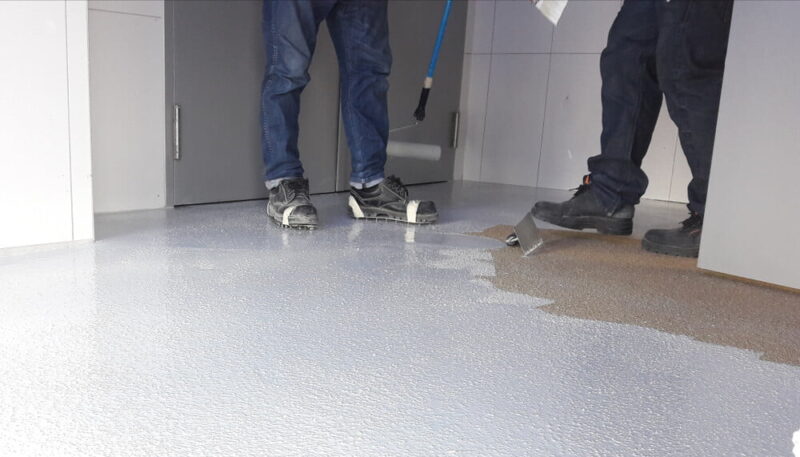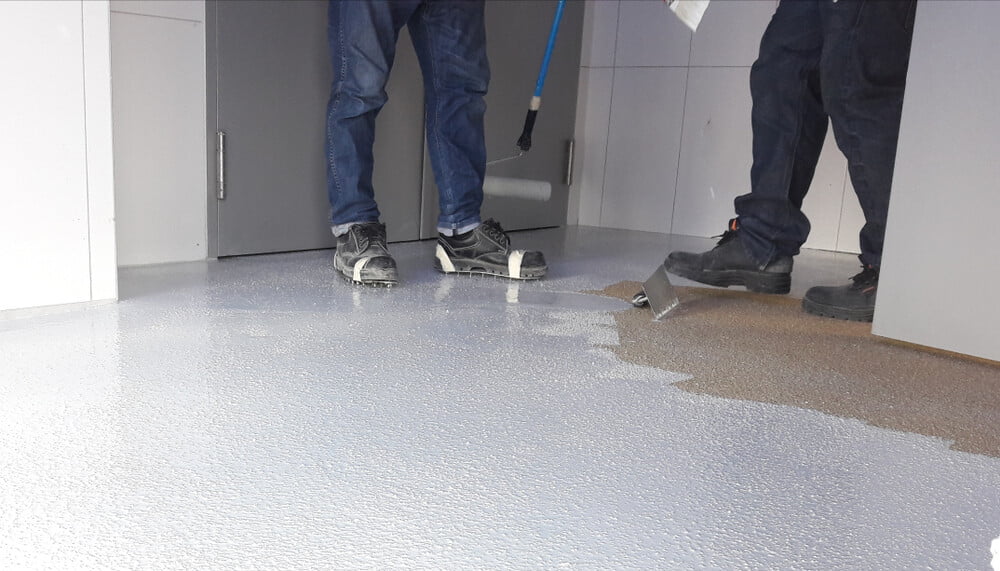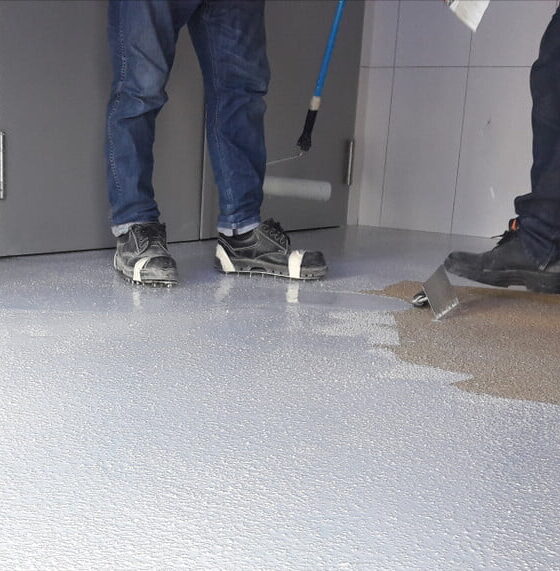Choosing a floor covering for a new house? Or maybe you started a renovation in your apartment? Don’t know how to do everything in time, and deadlines are running out? A few extra pairs of hands will definitely not hurt you. Transfer the scope of tasks to experienced movers who will help you move furniture out of the room, as well as help with moving to a new house with a new floor covering. Useful link to study information about moving with professionals. It can be tough to find a floor solution that stands the test of time whole being chemical, spills and stain resistant. Almost every type of flooring has some disadvantage or the other. And that’s one of the reasons as to why having stable shoes for walking on concrete is very important. An excellent choice for a variety of needs, epoxy floors seem to have fewer drawbacks and more benefits. However, examining both pros and cons of this material is a good idea if you’re considering installing it at home or work.
Pros of Epoxy Floors:
Appearance
Compared to an average garage floor, epoxy floors are bright and professional. Their appearance alone makes them enticing to use. The smooth and even surface is also very easy to sweep and maintain. Since not much sticks to this type of flooring, cleaning up a mess a very easy. Appearance is one of the most important considerations when choosing the best epoxy for wood floors.
Affordability
Compared to other types of flooring, the per square foot cost of epoxy floors are tough to beat. Since it can be installed directly over concrete and other flooring types, the installation costs are quite a bit lower than the others. Pricing remains one of the biggest and the most immediate advantages you’ll find with epoxy flooring.
Resistance
Epoxy floors are highly resistant to just about everything – oil, gasoline, bleach, transmission fluid, cleansers and more. This is one the main reasons they’re frequently used in garages and within the automotive industry. Besides withstanding chemical spills/cleaners, epoxy floor coating is also heat and water-resistant. They are almost impervious to most chemical spills without any negative effects on the coating.
Another pro is that these floors also resistant to bacteria and germs, which makes them very easy to sanitize. This is why epoxy is an excellent choice for hospitals and clinics.
Durability
Distinctly valued for their durability, epoxy floors have a longer lifespan than many other floor types. Concrete is the only material that beats it, but it needs to be properly sealed and maintained. Besides, an epoxy floor coating required concrete beneath it anyway. Epoxy floor coating makes renders concrete exceptionally durable. They also offer benefits of anti-fatigue and can be easily rolled-out on the cement without mortar or glue. But if you wish to go that extra step to care for your floors, consider getting yourself epoxy resins for wood on woodimprove.
Protective
Epoxy flooring protects the underlying concrete from moisture, stains, grease and cracks. In the long run, this can save you a great deal on cleaning and maintenance costs by eliminating the need to clean carpet or grout. It’s also very reasonably priced for the duration and level of protection that it offers.
However, the protective qualities of epoxy flooring depend on the installer. You need to find a quality local epoxy floorer. You can find epoxy flooring near me if this is a concern.
Longevity
Epoxy coating lasts longer than many types of flooring. When installed properly, it can last for several decades without cracking or peeling. Besides the durability, its lifespan makes it popular for commercial and industrial use.
Variety
Epoxy is a great choice to decorate your floors as well. It’s available in a variety of colors that add a flawless, smooth, elegant shine elegant shine. The flooring can also be arranged into traditional or personalized patterns and designs. The number of choices makes it an economical way to upgrade plain concrete and improve the ambience of a home or office.
Safety
One of the lesser-known advantages of using epoxy on a garage floor is it enhances visibility inside the garage by reflecting light off the floor.
Cons of Epoxy Floors:
Temporary
One of the major disadvantages of using epoxy on your floors is that it’s a temporary flooring solution. Though durable and resistant, you will have to replace it eventually. Unlike some other flooring solutions, everyday wear and tear takes it toll on epoxy floors. To keep things looking good, you’ll have to put down a new coat of epoxy. This is inevitable especially if heavy things are dropped on the surface of the floor.

Cracks can develop and chipping is a very common issue. Thought chips can start out as a small annoyance, eventually they can lead to a large area of the coat peeling off of the floor. Wheeled carts and toolbox wheels also get caught catch as they are rolled over the damaged spot. The floor has to be repaired when this happens.
Slippery
Epoxy floors are relatively skid resistant. This con is not universal. It’s specific only to oil-covered epoxy since that can be very slippery. But they can also become very slippery when wet, which creates a dangerous situation. They are not a good choice in areas that may be prone to spills or water on the floor. This is another drawback. However, you can mitigate this risk, at least to some degree, if you’re able to texturize your floor.
Preparation
Getting the existing floors ready for applying epoxy is tedious. A significant amount of effort goes into it to. The concrete floor has to be clean and free of any grease, oil, or solvents before the epoxy coating is applied. Cracks will need to be filled as well. Cleaning concrete floors requires multiple attempts. All this preparation work required is a drawback.
The good news is that with the advancements in the manufacture and application methods, homeowners will find it relatively easy to apply using hand tools in a minimum amount of time.
Application
Apart from the extensive preparation that goes into getting the concrete ready, applying the epoxy coating is a time-consuming process. It also takes several days to dry properly. Additionally, the first coat of epoxy must dry completely before adding the next coat.
If you’re in a time crunch, you can also utilize a penetrating concrete sealer instead. You’ll be able to save on time and cost, but the downside is you won’t have the aesthetic look of an epoxied garage floor.
Smell
Wet epoxy has strong fumes. Darker shades of epoxy have more hardeners than the lighter shades. They tend to have an ammonia smell after applying.
Sensitivity
Epoxy flooring needs to be installed exactly according to directions. If not done properly, the flooring will not last as long as it should. The coating also gets scratched pretty easily. It’s very hard to clean paint overspray off of it. The coating should be applied only when during that time of the year when the humidity levels are low. This is because moisture can affect the durability of these floors.
We recommend using a dehumidifier to lower humidity for a period of 24 hours before applying your first coat of resin. This will extract as much moisture from the air as possible which will prevent moisture from becoming trapped underneath the floor once the resin finish has been applied.
Adherence
The concrete floor must be dried, prepared and cleaned thoroughly before applying epoxy to avoid adherence issues. Epoxy does not adhere well in a moist environment such as a basement. The epoxy paint peels off the floors if applied in a damp environment on a moist floor.
Moisture
Since the material doesn’t breathe once it cures, any moisture trapped below the surface can be a problem as it evaporates. It may lead to the eventual need for repair or refinishing as bubbling or buckling in the flooring material may occur in some cases.
Additional Costs
Homeowners have to buy special cleaning acids and other chemicals to ensure that the epoxy sticks. It’s also necessary to buy and use special protective clothing, protective eyewear and breathing devices when using these chemicals. Not only does this increase the amount of time and effort necessary, but in some instance, it can also increase costs.
Removal
Once the epoxy is applied, changing colors or designs can be a labor-intensive and costly endeavor. In those situations where the floor has to be repaired, removing the coating is quite extensive and difficult.
There are several pros and cons to using epoxy floors. It’s highly recommended that you consult a professional contractor to conduct an analysis of your floor before making any decision. A professional can also evaluate the moisture tolerance of the floor to minimize the chances of delamination.
Must Read: Creating a Healthy Work Environment for Your Eco-Friendly Business


 Environment12 months ago
Environment12 months agoAre Polymer Banknotes: an Eco-Friendly Trend or a Groundswell?

 Features11 months ago
Features11 months agoEco-Friendly Cryptocurrencies: Sustainable Investment Choices

 Features12 months ago
Features12 months agoEco-Friendly Crypto Traders Must Find the Right Exchange

 Energy11 months ago
Energy11 months agoThe Growing Role of Solar Panels in Ireland’s Energy Future


















